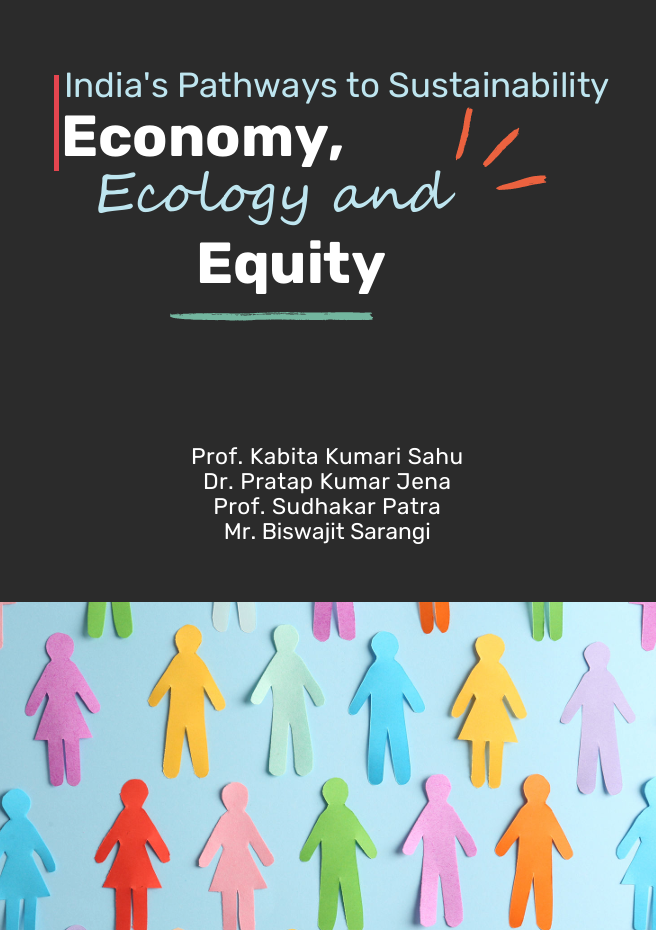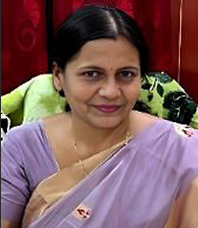
India's Pathways to Sustainability Economy, Ecology, and Equity
Prof. Kabita Kumari Sahu, Dr. Pratap Kumar Jena, Prof. Sudhakar Patra and Mr. Biswajit Sarangi
FORMAT
Paperback and e–book
ISBN
978-93-49359-35-2
DOI
doi.org/10.5281/zenodo.17164276
PAGES
322 pages
PRICE
Rs. 1000/- ($80)
About The Editors

Prof. Kabita Kumari Sahu is currently serving as Professor and Head, Department of Economics at MSCB University (erstwhile North Orissa University), Baripada, Odisha. She earned her M.Phil. & PhD degrees from Utkal University, Bhubaneswar, and has contributed over 125 publications to reputed journals and edited volumes to date. Her academic work includes four textbooks, four research books, and three edited books. She has also completed two ICSSR-funded research projects, with one ongoing project funded under UFIRP. She has to her credit the supervision of 07 Ph.D. and 35 M.Phil. scholars, while 07 Ph.D. scholars are still pursuing their research under her guidance.

Dr. Pratap Kumar Jena is working as a full-time Assistant Professor of Economics (teaching and research) in the Department of Economics, Maharaja Sriram Chandra Bhanja Deo University. He has nearly 13 years of teaching experience at the PG level. Before joining this university, he worked for a short period at GITAM University, Vishakhapatnam and Central University of Karnataka. He obtained his Master's degree, M.Phil. degree and Ph.D. degree from the University of Hyderabad. He has been teaching Macroeconomics, International Trade & Finance, Econometrics and Time Series Modelling to MA students. His research interests are broadly in the commodity market, climate change, agriculture, rural development and applied macroeconomics. He has published 3 books, 7 book chapters and 22 research papers in refereed journals, and also completed 4 research projects.

Prof. Sudhakar Patra is presently serving as RBI Chair Professor, PG Department of Analytical & Applied Economics, Utkal University, Bhubaneswar. He was a former Professor & Head, Economics and Dean, Faculty of Humanities and Social Sciences, Berhampur University, Odisha. Prof. Patra has 36 years of teaching and research experience, completed 05 research projects and published 23 Books, 109 research papers in Journals & 48 chapters in edited books. Prof. Patra has guided 17 research scholars for Ph.D./D.Lit degree and has made 13 academic visits to different foreign countries. He teaches financial Programming, Monetary Management, Econometrics, and Mathematical Economics. Apart from many NAAC visits as a Peer Team Member, he is an expert in data analysis in SPSS, STATA, and EViews.

Mr. Biswajit Sarangi is currently serving as an Assistant Professor in Economics at CDOE (Centre for Distance and Online Education), MSCB University (erstwhile North Orissa University), Baripada, Odisha, and is also pursuing his PhD from the same University. He completed his Graduation in Economics from F. M. Autonomous College, Balasore, in 2020 with a CGPA of 8.51, and his Post-graduation in Analytical & Applied Economics from Utkal University, Bhubaneswar, in 2022, securing a 9.05 CGPA with specializations in Econometrics, Mathematical Economics, and Financial Institutions & Markets. To date, he has published seven papers in various reputed journals, three books and one book chapter.
About The Book
This book presents a collection of twenty-one scholarly papers that explore different aspects of sustainable development, economic growth, and social equity in India. Divided into four thematic parts, the book covers a broad spectrum of issues. The first part examines the dynamics of sustainable economic growth, addressing health expenditure, income inequality, financial inclusion, FDI, and agricultural transformation. The second part focuses on energy, industry, and environmental sustainability, with chapters on air pollution, decarbonization strategies, low-carbon energy adoption, clean cooking initiatives, and green political agendas. The third part highlights technological innovations and sustainable solutions, showcasing the role of AI, green innovation, the circular economy, and inclusive leadership in driving change. The final section presents sectoral and regional perspectives, with studies on heatwaves and labour productivity, education through a gender lens, empowerment of marginalized and tribal communities, and management of land resources. Importantly, it also features a study on Nepal’s hill communities, reflecting shared ecological challenges and cultural adaptations between India & Nepal, thereby broadening the book’s regional relevance. Altogether, the book offers fresh evidence, regional insights, and policy directions for achieving inclusive and sustainable growth.




